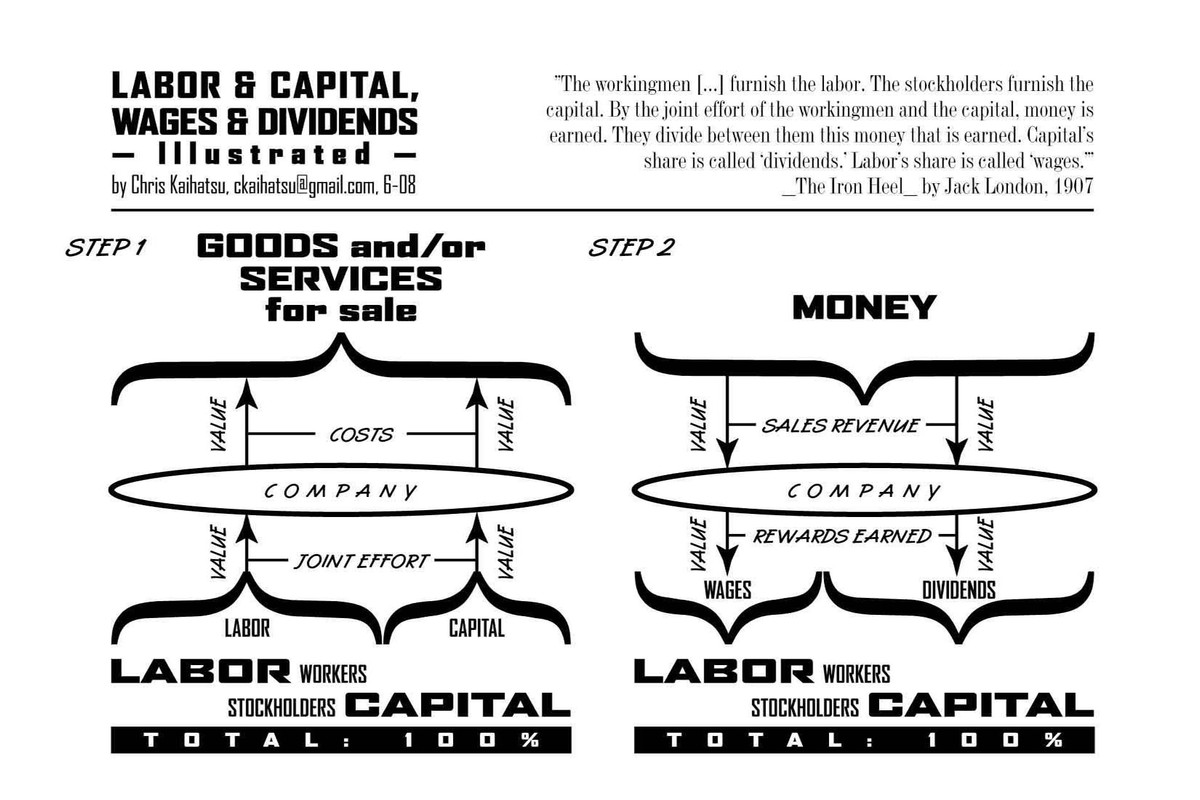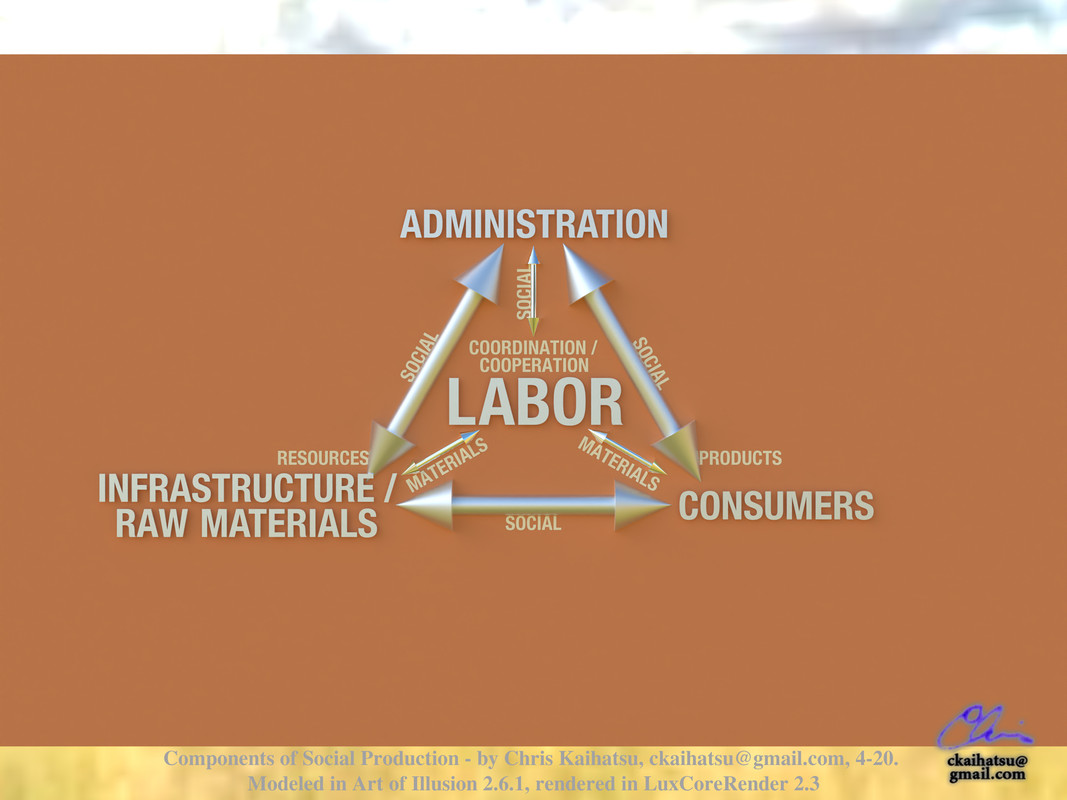Politics_Observer wrote:
@Rancid
I think it's OK to have some inefficiency if that means taking care of people a little better. You don't want too much inefficiency though because then the business and the economy become un-sustainable due to a lack of efficiency. It's that happy middle ground.
Please notice that you're taking the perspective of the *owner* / employer, and you're *not* including the perspective of the *worker* at all -- this means that the owner / employer is the *protagonist*, and *controls* the business and revenue, while the worker *doesn't*.
Why wouldn't the employer just *ask* the workers how to 'take care of people a little better'? (Rhetorical question, of course.)
[11] Labor & Capital, Wages & Dividends
---
Oxymoron wrote:
How would you feel if a inferior worker got the same compensation? If a person feels under appreciated, then they aren't being taken care of, now are they.
An 'inferior worker' -- and who, exactly, *makes* that determination?
You're acting as though this is some kind of mythological 'clean' market transaction, between the employer and the worker, with no power dynamic involved, and no economic / material coercion involved. (I'd be glad to explain what I mean, if you like.)
Oxymoron wrote:
I know a pat on the back can work, and other ways of appreciating people. But nothing in the world signifies it like partaking in the success you help produce.
Whose 'success', exactly? Do you realize how *patronizing* all of this sounds? It's because there's a *power relation* involved -- the employer and worker are not some pair of chummy businesspeople, no matter how much you may *pretend* it to be so.
Oxymoron wrote:
Not taking care of your workers, is the same as not taking care of your equipment or your bank account. The workers are part of your success, and should be treated that way Union or no Union. Those companies and leaders who understand this concept succeed, and even though there are many that do not value their workers and still do well... The market will make them pay eventually, and the best practices will always bubble to the top.
More mythology. Now for a reality check:
Opposition to trade unions
A sticker expressing an anti-Amazon message is pictured on the back of a street sign in Seattle.
Amazon has opposed efforts by trade unions to organize in both the United States and the United Kingdom. In 2001, 850 employees in Seattle were laid off by Amazon.com after a unionization drive. The Washington Alliance of Technological Workers (WashTech) accused the company of violating union laws and claimed Amazon managers subjected them to intimidation and heavy propaganda. Amazon denied any link between the unionization effort and layoffs.[55] Also in 2001, Amazon.co.uk hired a US management consultancy organization, The Burke Group, to assist in defeating a campaign by the Graphical, Paper and Media Union (GPMU, now part of Unite the Union) to achieve recognition in the Milton Keynes distribution depot. It was alleged that the company victimized or sacked four union members during the 2001 recognition drive and held a series of captive meetings with employees.[56]
An Amazon training video that was leaked in 2018 stated "We are not anti-union, but we are not neutral either. We do not believe unions are in the best interest of our customers or shareholders or most importantly, our associates."[57] Two years later, it was found that Whole Foods was using a heat map to track which of its 510 stores had the highest levels of pro-union sentiment. Factors including racial diversity, proximity to other unions, poverty levels in the surrounding community and calls to the National Labor Relations Board were named as contributors to "unionization risk".[58] Data collected in the heat map suggest that stores with low racial and ethnic diversity, especially those located in poor communities, are more likely to unionize.
https://en.wikipedia.org/wiki/Criticism ... ade_unions
---
Oxymoron wrote:
That is actually not true, giving a competitive salary/benefits to workers in a strategic way, actually improves morale and productivity which in turn increases profits.
Every dollar given to the workers in the form of wages and benefits is a dollar that is *definitely* not going to the owner / employer as profit.
Oxymoron wrote:
Its not as simple as giving more money, work needs incentives both financial, personal growth, and appreciation. If a worker is making less then he needs to live comfortably his work will demonstrate that(late for work, leaving early etc). your second statement about classic tactics, those tactics were a response and in conflict with the vile Marxist undercurrents of the 19th early 20th century. When that insidious ideology is at bay, Capitalist want nothing more then to help and support their workers. Even back then people Like Ford and Hershey specifically thought of the well being of their workers, the first gave highest wages for his workers and the latter actually built a whole town to make life better for this workers. I think people miss the forest for the trees.
A company town is a place where practically all stores and housing are owned by the one company that is also the main employer. Company towns are often planned with a suite of amenities such as stores, houses of worship, schools, markets and recreation facilities. They are usually bigger than a model village ("model" in the sense of an ideal to be emulated).
Some company towns have had high ideals, but many have been regarded as controlling and/or exploitative. Others developed more or less in unplanned fashion, such as Summit Hill, Pennsylvania, United States, one of the oldest, which began as an LC&N Co. mining camp and mine site nine miles (14.5 km) from the nearest outside road.
https://en.wikipedia.org/wiki/Company_town
---
Drlee wrote:
I remember when there was no online.
Were you friends with the stegosaurs back then -- ? (grin) (just fucking around)
---
Oxymoron wrote:
They make more money, and lower productivity... Until their employer can no longer compete with non Union competitors. Then the Unions start squirming because people start loosing their jobs. Companies do reward their best workers, like I said this is not always the case but most times it is the case.
With blue ribbons and gumdrops. (yeesh)
Oxymoron wrote:
Those companies that have a high turn over of employees are typically not healthy companies. You tell me I am spewing propaganda, but at least I made an argument. Your argument is that Union workers make more money..... 
Well, don't the workers have an intrinsic interest in making more money, like any other person?






















 - By Fasces
- By Fasces - By wat0n
- By wat0n